1. Perception about Prospects of Military Conflict
1-1 Will a Military Clash Occur in East Asia?
Will a military clash occur?
The survey results indicate that Japanese and Chinese respondents share a keen sense of crisis about a possible military clash in the East Asian region. As many as 58.9% of the Japanese respondents -- including those who say it is "somewhat likely" -- think a military clash may occur. Meanwhile, only 21.9% of the Japanese respondents disagree, including those who say it is "somewhat unlikely."
Also in China, 43% agree that a military clash will occur, making a majority group among the Chinese respondents and thus indicating their strong sense of crisis.
Meanwhile, only 29% of the South Korean respondents predict a military clash and 46.4% denied the likelihood. The responses of the Koreans in the survey indicate that they have a much weaker sense of crisis.
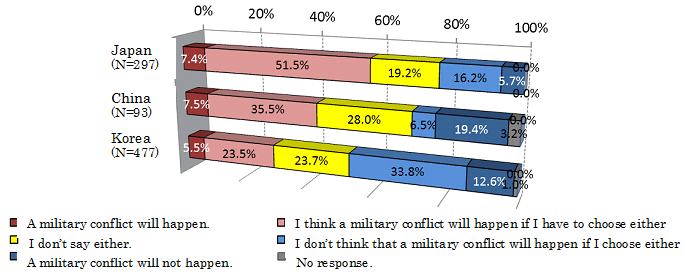
Where in East Asia will a military clash occur?
The survey respondents, who predict a military clash, are asked where it will happen in the region. In every country, the East China Sea is named by the largest group of respondents: 45.5% in Japan, 44.6% in China and 62.3% in South Korea. The South China Sea is named by 30.2% in Japan but only by 13.5% in China, indicating a perception gap between Japan and China.
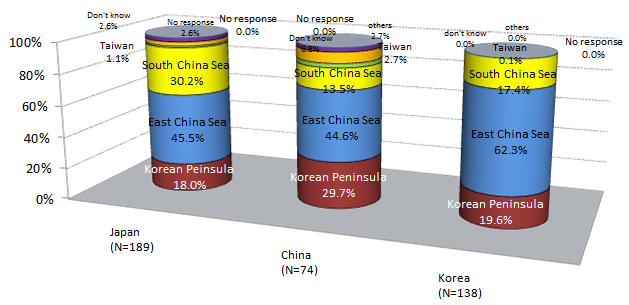
2. Assessment of Formal Government-to-Government Diplomacy
2-1 Is Government-To-Government Diplomacy Functioning Properly?
Can formal government-to-government diplomacy prevent conflicts?
Although the largest groups of respondents in the three countries answer in the affirmative to the question, they represent no more than half the respondents in each country. This indicates they altogether do not have too much hope for formal diplomacy.
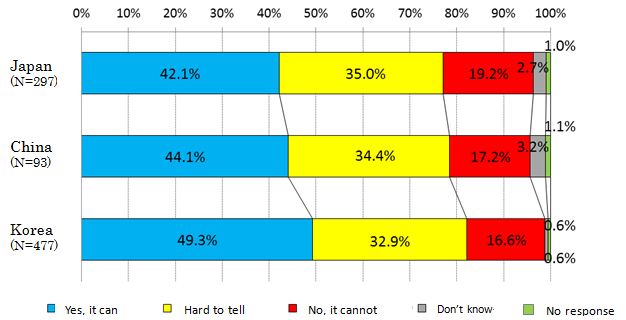
Is government-to-government diplomacy functioning effectively?
As many as 85.2% of the Japanese respondents -- including those who said it is not functioning "somewhat" -- do not think government-to-government diplomacy is functioning effectively. The opposite group represents 7.7%, including those who say it is functioning somewhat. Such a negative view about formal diplomacy is shared also by 59.2% of the Chinese respondents and 67.7% of the South Korean respondents. Altogether, the respondents share a similarly pessimistic assessment.
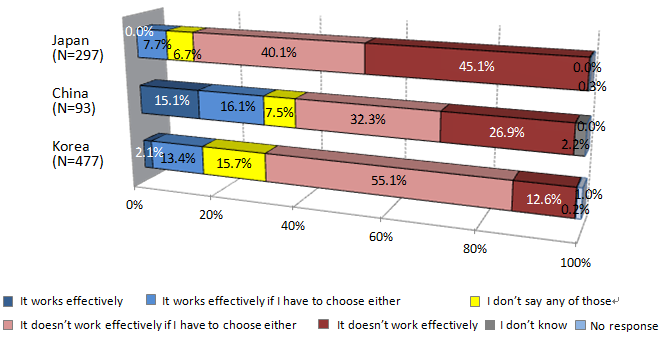
Why is formal diplomacy not functioning?
The question is asked to those respondents who reply formal diplomacy is not functioning. The most prominent reason given by the largest group of the Japanese respondents is "domestic political situations" of the respective countries. The largest groups of Chinese (32.9%) and South Korean (32.8%) respondents refer to "confrontation over territorial issues and historical perceptions" as reasons for formal diplomacy not functioning. Many other Chinese (26.3%) and South Korean (27.6%) respondents also refer to "public opinion based on overheated nationalism." Issues related to "past history" altogether account for more than a majority of Chinese and South Korean responses. "Remarks and actions of Japanese prime minister(s)" -- often a prominent target of criticism in South Korea and China -- ranks second in the list of reasons in the survey in China, yet it is nominated by less than 30% of the respondents in China.
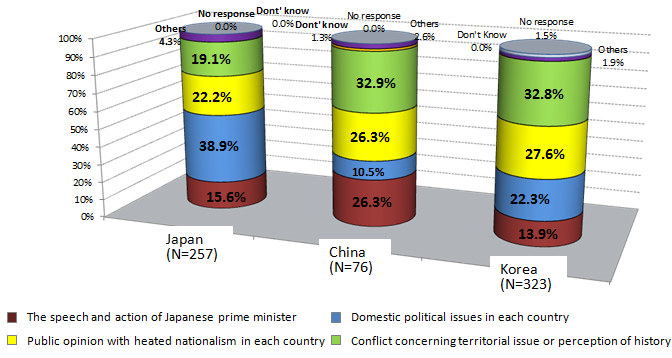
3. Perception of Civil Diplomacy
3-1 What is Expected of Civil Diplomacy?
Executive Summary: Expectations for "civil diplomacy" are growing in all three countries. The respondents count on "NPOs and NGOs" as leading "players of civil diplomacy."
Expectations for Civil Diplomacy
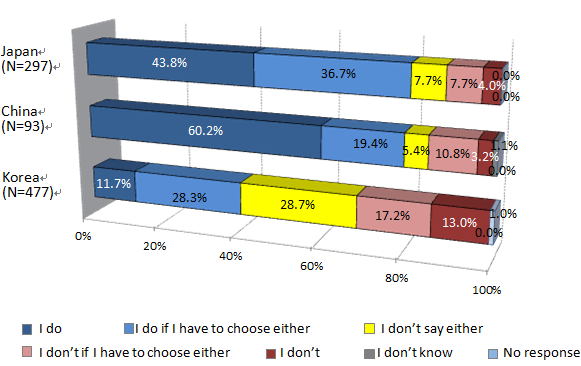
Roles of Civil Diplomacy
*This question was not included in the survey conducted in South Korea.
The Japanese and Chinese share a similar trend in their responses about expectations for civil diplomacy: 53.7% in Japan and 60.7% in China expect civil diplomacy to "promote civic exchanges and mutual understanding of the peoples of the two countries." Also, 26.4% in Japan and 22.6% in China expect civil diplomacy to play the role of paving the way for formal diplomacy to get back on track. Yet, only about 10% of the respondents in each of the two countries -- 10.7% in Japan and 8.3% in China -- expect civil diplomacy to fill the vacuum as an alternative diplomatic operation. It indicates their shared view of civil diplomacy only playing supplementary roles, not working as a powerful alternative to government diplomacy.
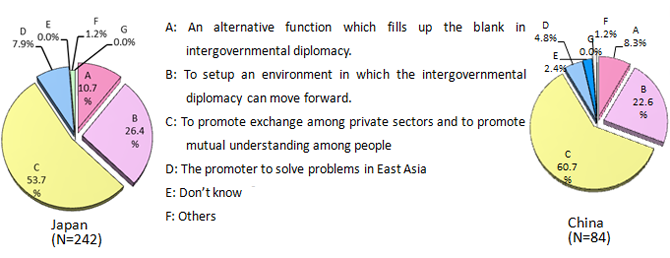
Leading Actors of Civil Diplomacy
Majorities of respondents in each country -- 70.4% in Japan, 58.1% in China and 63.9% in South Korea -- agree that "non-profit organizations such as NPOs and NGOs" are leading actors of civil diplomacy. It is notable that as many as 47.5% of the Japanese respondents name "people perceiving themselves responsible for settling the issues" also as leading actors.
In the survey in China, 55.9% of respondents also name "media," ranking it second only after "NPOs and NGOs." In contrast, only 34.3% of the Japanese respondents refer to media. Meanwhile, as many as 62.3% of the Koreans surveyed also name "intellectuals/influential commentators" as leading actors while 50.1% expect "corporations" as well to play the role.
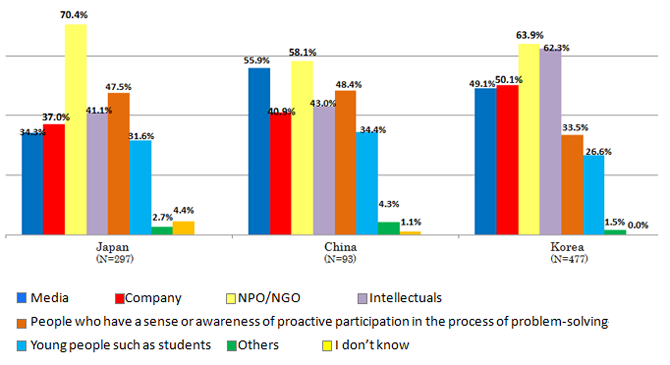
Expectations for "Public Diplomacy"
Governments often promote public relations activities directly to the people of other countries in what is known as "public diplomacy." In the survey, Japanese, Chinese and South Korean respondents all share high expectations for such public diplomacy; 56.9% of respondents in Japan, 77.4% in China and 51.8% in South Korea positively and passively express expectations for it. China, in particular, stands out with strong expectations, with nearly 80%, which seems to indicate their support for their government's policy of promoting it. In all three countries, those somewhat or strongly negative about it remain much smaller in number, with 26.2% in Japan, 9.7% in China and 27.4% in South Korea.
4. Multilateral Dialogue
4-1 Necessity of Governmental Multilateral Dialogue
Necessity of multilateral dialogue
With the territorial dispute in the East China Sea coming closer to a critical military issue, 96.3% of Japanese respondents positively or passively express the need for multilateral dialogue among governments. Meanwhile, only 0.3% of them denied the need. Also, 90.3% of the respondents in China and 93.0% in South Korea agree about the need; negative responses were made only by 7.5% in China and 2.1% in South Korea.
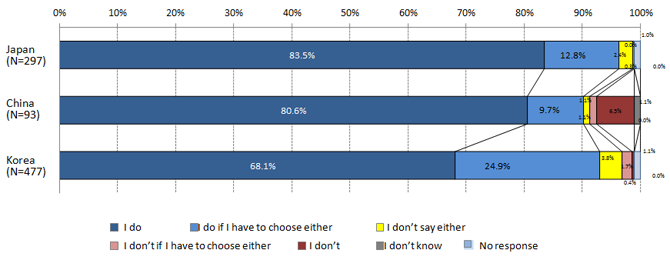
Desirable Diplomatic Framework
In order to prevent a military clash in the East China Sea, 32.0% of the Japanese respondents hope "Japan-U.S.-China negotiations" will lead to a settlement, making it the No. 1 choice. Meanwhile, only 15.8% of them express expectations that "Japan-China" dialogue will provide a hopeful diplomatic framework. In China, the respondents express similar expectations for multilateral and bilateral dialogues: Two groups each accounting for 29.0% of the respondents, respectively, call for "Japan-U.S.-China negotiations" and for "Japan-China" negotiations. In the survey in South Korea, 31.0% select "Japan-U.S.-China negotiations" and as many as 25.4% indicate expectations for the "East Asian Summit."
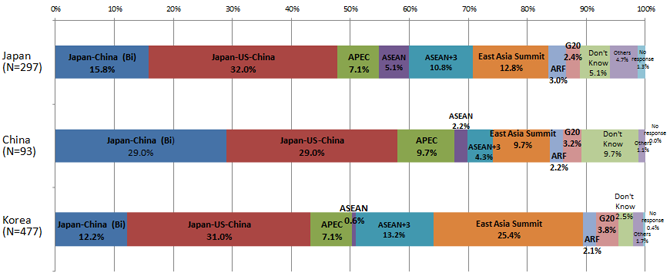
The surveys were conducted in a questionnaire form on selected intellectuals and opinion leaders in Japan, China and South Korea between March 19 and March 25, 2014. Survey questions were emailed in Japan to those who had participated in discussions organized by The Genron NPO in the past and 297 people responded. In China, 93 people responded to the same survey. In South Korea, the East Asia Institute, chose those to be surveyed and 477 replied. The respondents are viewed to represent the intellectuals and informed commentators in their respective countries. It should be noted that percentage figures of the survey replies are often rounded and/or based on multiple replies, and therefore do not always total 100%.
Post a comment